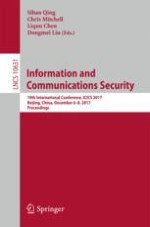2018 | OriginalPaper | Buchkapitel
Machine Learning for Black-Box Fuzzing of Network Protocols
verfasst von : Rong Fan, Yaoyao Chang
Erschienen in: Information and Communications Security
Aktivieren Sie unsere intelligente Suche, um passende Fachinhalte oder Patente zu finden.
Wählen Sie Textabschnitte aus um mit Künstlicher Intelligenz passenden Patente zu finden. powered by
Markieren Sie Textabschnitte, um KI-gestützt weitere passende Inhalte zu finden. powered by
